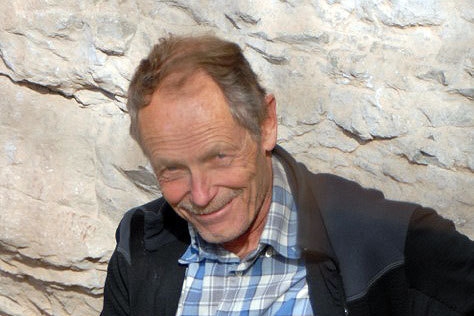Erri De Luca, the mountains, alpinism and life in general
Interview with the writer, poet and alpinist Erri di Luca by Manuel Lugli. Nine questions to discuss alpinism, the mountains, friendship and life in general.

 1 / 3
1 / 3
Erri De Luca
 Manuel Lugli
Manuel Lugli
In an article published recently by Lo Scarpone (the Italian Mountaineering Club magazine) and on Planetmountain, the author Alessandro Gogna notes how in recent years there has been an increasing tendency to restrict access to mountain activities on behalf of the authorities. What do you think?
Some claim that the mountains need to be safe and taken to with insurance policies? Impossible, those who go into the mountains, even on a path, are faced with their weekend risk. Should integral solos be abolished? An armed guard placed at the base of every rock face? Fines given on the summit? The mountains won't let themselves be devitalized by safety measures, by prohibitions. Otherwise alpinist-smugglers will become the norm.
Talking about regulating mountain activities: even in the Himalaya there has been a rise in the quantity - and quality - of rescue operations. Is a real "Himalayan rescue service" feasible?
Himalayan rescues increase with the ability of helicopters to fly at extremely high altitudes. But that environment will always remain a place far removed from the immediate operation in the Alps as these are far more populated and with plenty of infrastructure. The Himalaya remains a place which is hard to tame.
You know the Himalayas well and you've experimented the power of that "white factory". What motivated you to go there and what still remains after all these years?
I was driven by the desire to go on a pilgrimage. Someone who loves the mountains, at least once in their lives, if they can afford it must travel to the supreme giants of geography. I was fortunate enough to travel with Romano Benet and Nives Meroi, to watch them move and just from this I learnt plenty. And I also travelled with men who never returned home, learning about the existence of being shipwrecked on land.
That experience paved the way for a special friendship with Nives and Romano, so much so that you wrote about it in Sulla traccia di Nives published by Mondadori. Was "love" the key to Romano's survival from his illness?
Those two invented alpinism as a couple, which is unlike all other partnerships as at the end of day these untie the knot. Romano and Nives keep it tied tight, invisible and certain, in all their daily actions, during those fortunate moments on the top of the highest mountains and during those unfortunate times in intensive care which Romano was sent to during these last two years. They are a couple and allies, the opposite of alpinism which remains individualistic, even when with a climbing partner.
News of special, new, difficult ascents in the Himalaya are few and far between. Is this, too, a sign of the times
All that remains for cutting-edge alpinism are integral solos up extreme difficulties and the ascents of the last untouched Himalayan peaks, climbed in the worst season. And the unrepeatable hasn't been achieved yet.
Talking of extreme undertakings, many alpinists sacrifice love, careers, lives and their families to experience the mountains in absolute terms. What do you think about this?
My thoughts are simple and easy to prove: achievements in the mountains don't make an athlete a man, just like goals, first places in the various rankings of professions and the arts are not enough to ensure the person's humanity.
Does your book Peso della farfalla contain a similar story? (Editor's note, the weight of a butterfly, in which the protagonist sacrifices his time to hunting and the mountains, neglecting the rest of his life until it is too late)
For me it's the story about the physical decline of two examples of mountain biology, a man and a chamois. The difference between these two species lies in the way in which they deal with being close to the end. The man believes he can retreat to a protected area down in the valley and therefore wants to snatch another victory from the mountain, while the beast knows that he has to give way to life.
Walter Bonatti was an extremely talented alpinist and at the height of his career he decided to dedicate his attention to other things. A choice dictated by extreme courage?
The great know when to retreat, they leave the table while they are still desired. Bonatti continued his search for spaces in different terrain. He was an explorer, one of those who enter the immensity alone, armed with curiosity, the spirit of adaptability to all surfaces and climates, and always bearing the extra burden of paper, a pen and a camera. Defining him an alpinist is an understatement: he was the last of our explorers, on foot and with a compass.
The sea, which you know well, is often compared to the mountains for it's "absoluteness". What do you think about this?
The sea is an ancient road for communication, from which humans have learnt about the planet. A Portuguese proverb states navigating is obligatory. The mountains are the opposite, a barrier, to be circumnavigated, a border area where life is difficult. The rules of the sea don't hold true in the mountains. Only knots, taken from the ships, have been transferred to the ropes of climbers, with the obstinacy of having changed their names.
Interview by Manuel Lugli
Some claim that the mountains need to be safe and taken to with insurance policies? Impossible, those who go into the mountains, even on a path, are faced with their weekend risk. Should integral solos be abolished? An armed guard placed at the base of every rock face? Fines given on the summit? The mountains won't let themselves be devitalized by safety measures, by prohibitions. Otherwise alpinist-smugglers will become the norm.
Talking about regulating mountain activities: even in the Himalaya there has been a rise in the quantity - and quality - of rescue operations. Is a real "Himalayan rescue service" feasible?
Himalayan rescues increase with the ability of helicopters to fly at extremely high altitudes. But that environment will always remain a place far removed from the immediate operation in the Alps as these are far more populated and with plenty of infrastructure. The Himalaya remains a place which is hard to tame.
You know the Himalayas well and you've experimented the power of that "white factory". What motivated you to go there and what still remains after all these years?
I was driven by the desire to go on a pilgrimage. Someone who loves the mountains, at least once in their lives, if they can afford it must travel to the supreme giants of geography. I was fortunate enough to travel with Romano Benet and Nives Meroi, to watch them move and just from this I learnt plenty. And I also travelled with men who never returned home, learning about the existence of being shipwrecked on land.
That experience paved the way for a special friendship with Nives and Romano, so much so that you wrote about it in Sulla traccia di Nives published by Mondadori. Was "love" the key to Romano's survival from his illness?
Those two invented alpinism as a couple, which is unlike all other partnerships as at the end of day these untie the knot. Romano and Nives keep it tied tight, invisible and certain, in all their daily actions, during those fortunate moments on the top of the highest mountains and during those unfortunate times in intensive care which Romano was sent to during these last two years. They are a couple and allies, the opposite of alpinism which remains individualistic, even when with a climbing partner.
News of special, new, difficult ascents in the Himalaya are few and far between. Is this, too, a sign of the times
All that remains for cutting-edge alpinism are integral solos up extreme difficulties and the ascents of the last untouched Himalayan peaks, climbed in the worst season. And the unrepeatable hasn't been achieved yet.
Talking of extreme undertakings, many alpinists sacrifice love, careers, lives and their families to experience the mountains in absolute terms. What do you think about this?
My thoughts are simple and easy to prove: achievements in the mountains don't make an athlete a man, just like goals, first places in the various rankings of professions and the arts are not enough to ensure the person's humanity.
Does your book Peso della farfalla contain a similar story? (Editor's note, the weight of a butterfly, in which the protagonist sacrifices his time to hunting and the mountains, neglecting the rest of his life until it is too late)
For me it's the story about the physical decline of two examples of mountain biology, a man and a chamois. The difference between these two species lies in the way in which they deal with being close to the end. The man believes he can retreat to a protected area down in the valley and therefore wants to snatch another victory from the mountain, while the beast knows that he has to give way to life.
Walter Bonatti was an extremely talented alpinist and at the height of his career he decided to dedicate his attention to other things. A choice dictated by extreme courage?
The great know when to retreat, they leave the table while they are still desired. Bonatti continued his search for spaces in different terrain. He was an explorer, one of those who enter the immensity alone, armed with curiosity, the spirit of adaptability to all surfaces and climates, and always bearing the extra burden of paper, a pen and a camera. Defining him an alpinist is an understatement: he was the last of our explorers, on foot and with a compass.
The sea, which you know well, is often compared to the mountains for it's "absoluteness". What do you think about this?
The sea is an ancient road for communication, from which humans have learnt about the planet. A Portuguese proverb states navigating is obligatory. The mountains are the opposite, a barrier, to be circumnavigated, a border area where life is difficult. The rules of the sea don't hold true in the mountains. Only knots, taken from the ships, have been transferred to the ropes of climbers, with the obstinacy of having changed their names.
Interview by Manuel Lugli
Note:
| Planetmountain | |
| News Erri de Luca | |
Latest news
Expo / News
Expo / Products
Under Helmet and caps 100% organic.
Lightweight ice climbing crampons
Technical mountaineering ice axe
A trail running backpack ideal for running in any weather condition. Thanks to the HDry membrane, this backpack is fully waterproof.
A featherlight insulated layer for cool, high-output days when you need breathability and a touch of warmth
Hiking boots AKU Superalp V-Light GTX, ideal for High Routes of the Dolomites and treks of several days



 Copia link
Copia link























